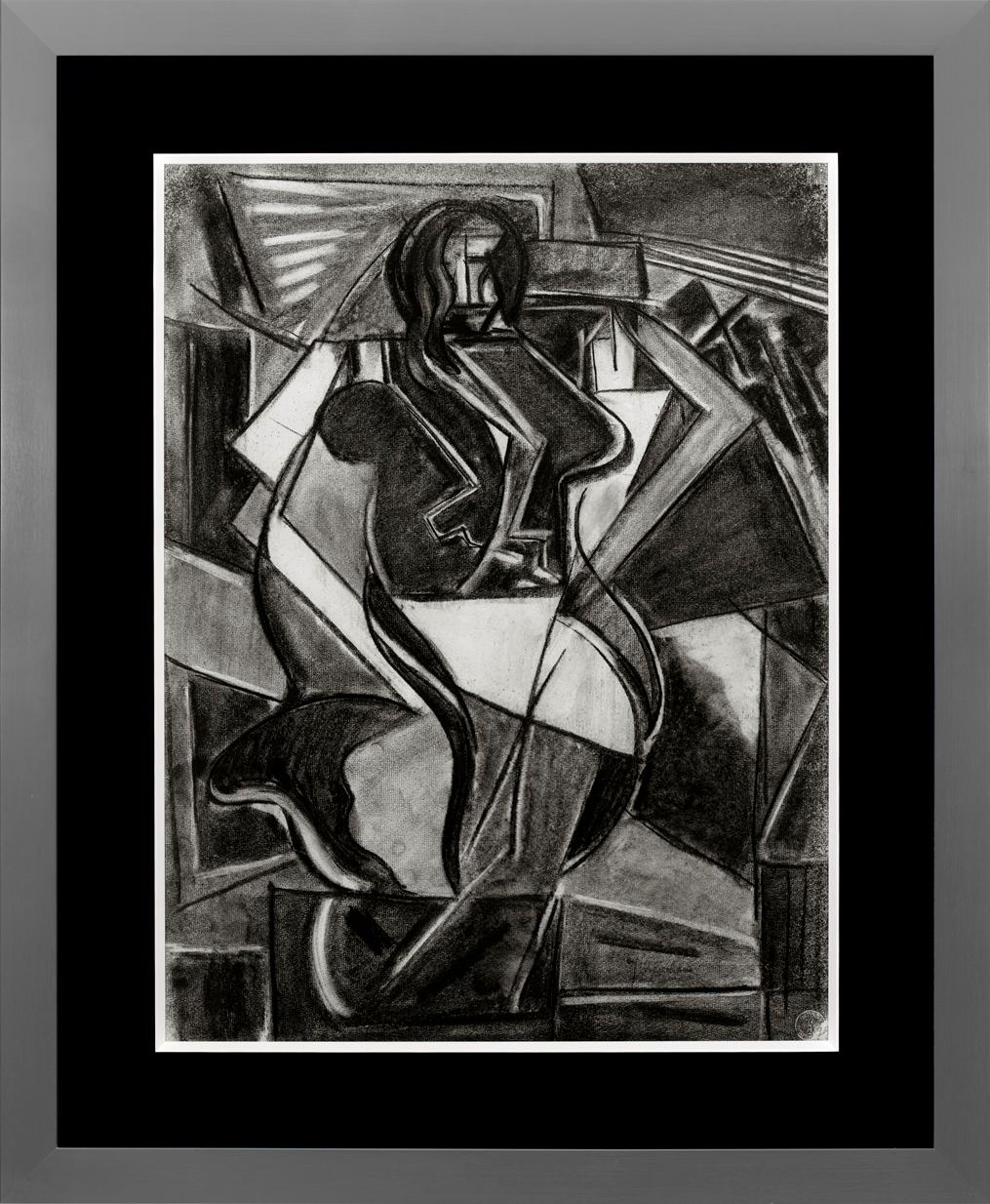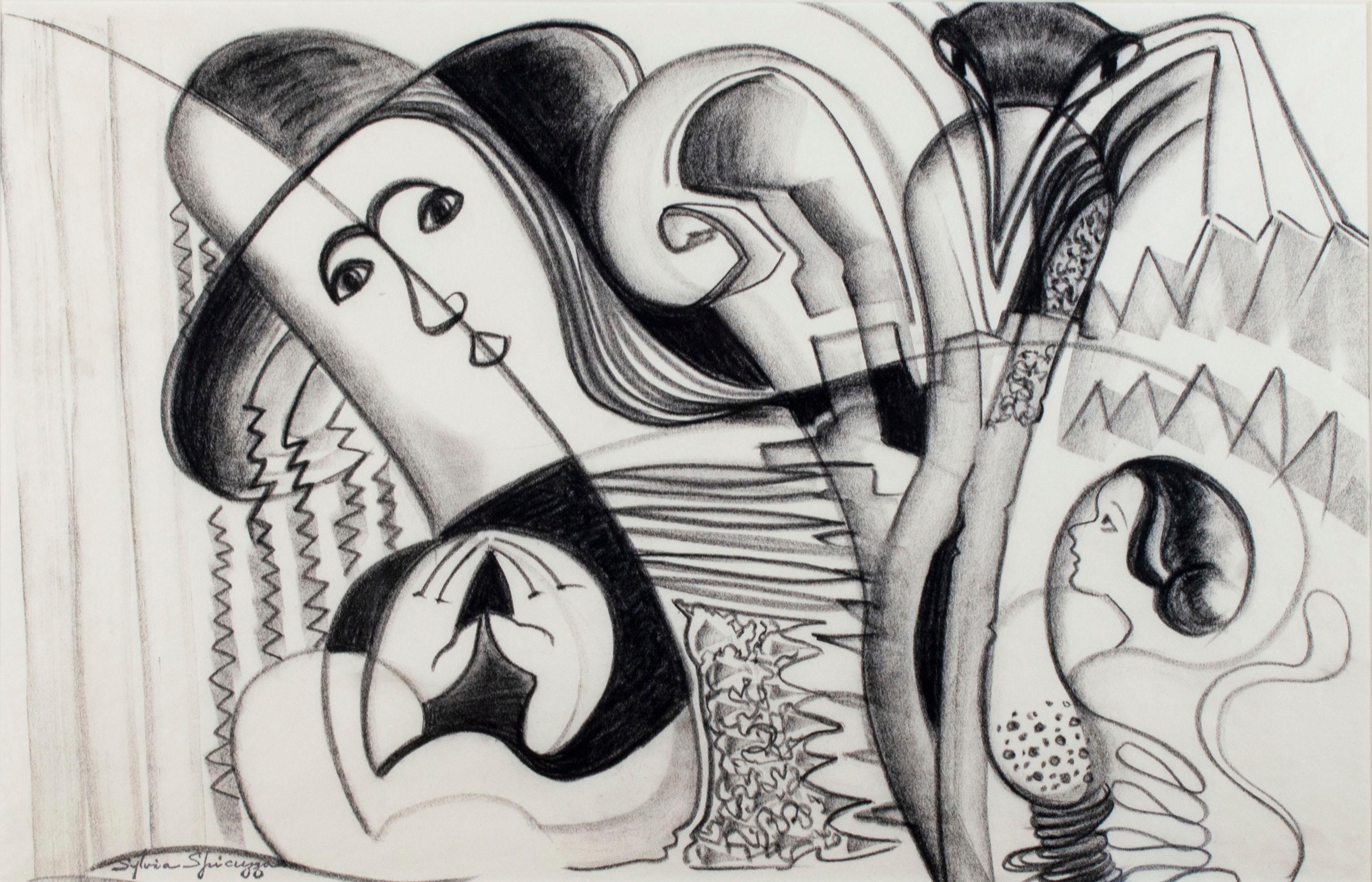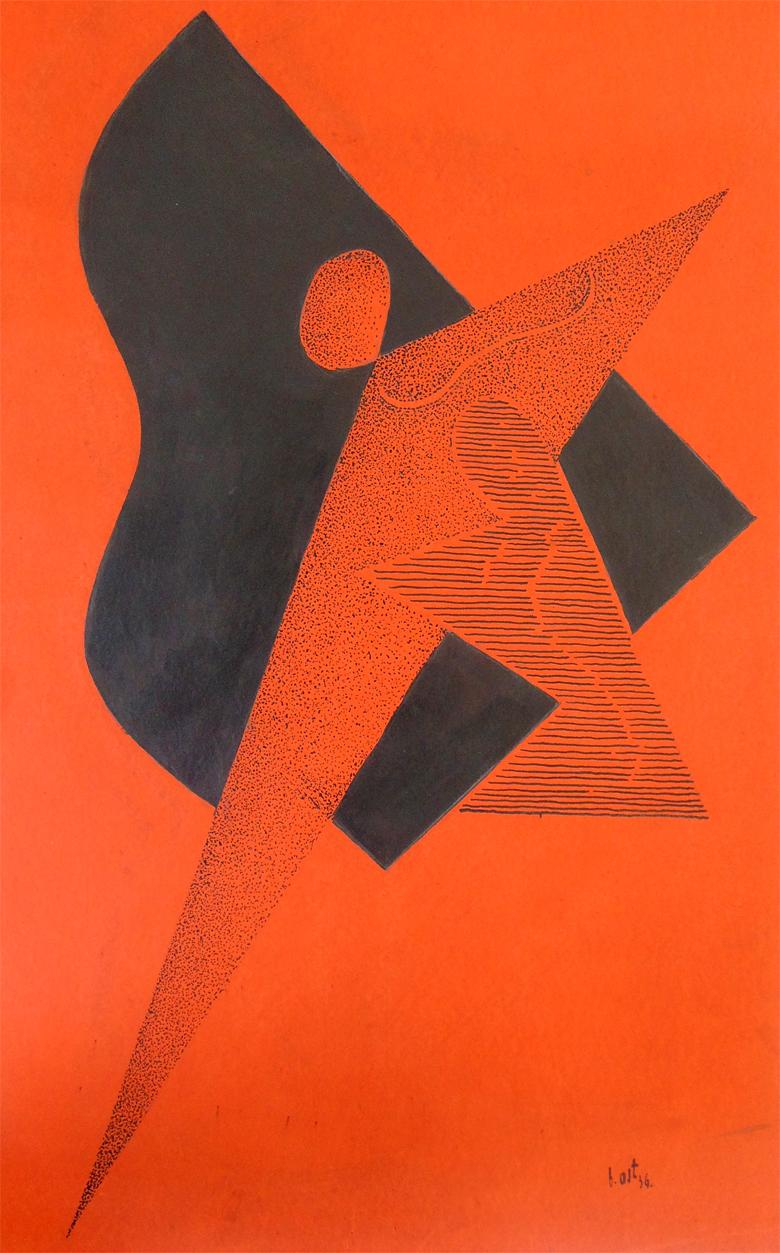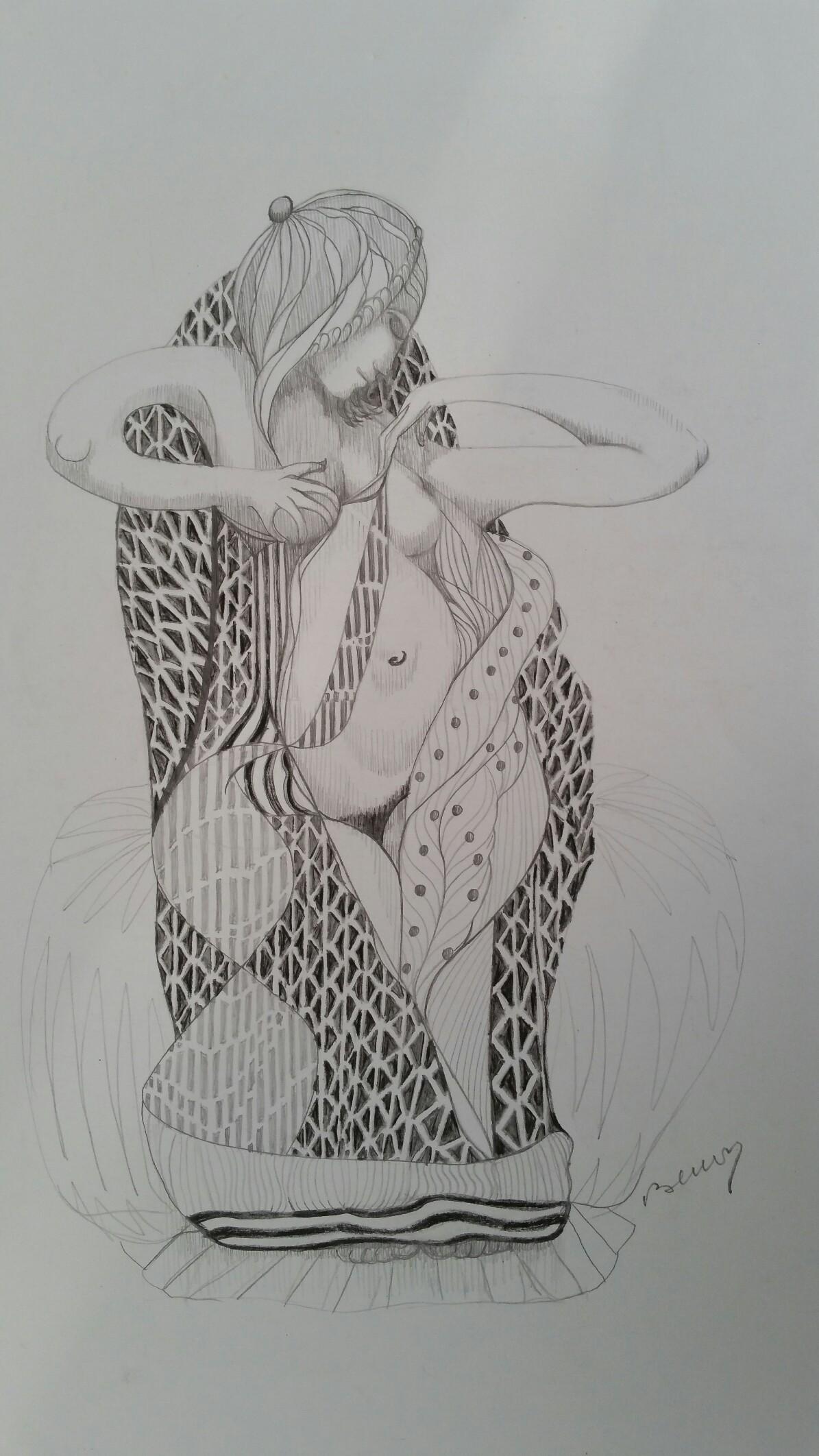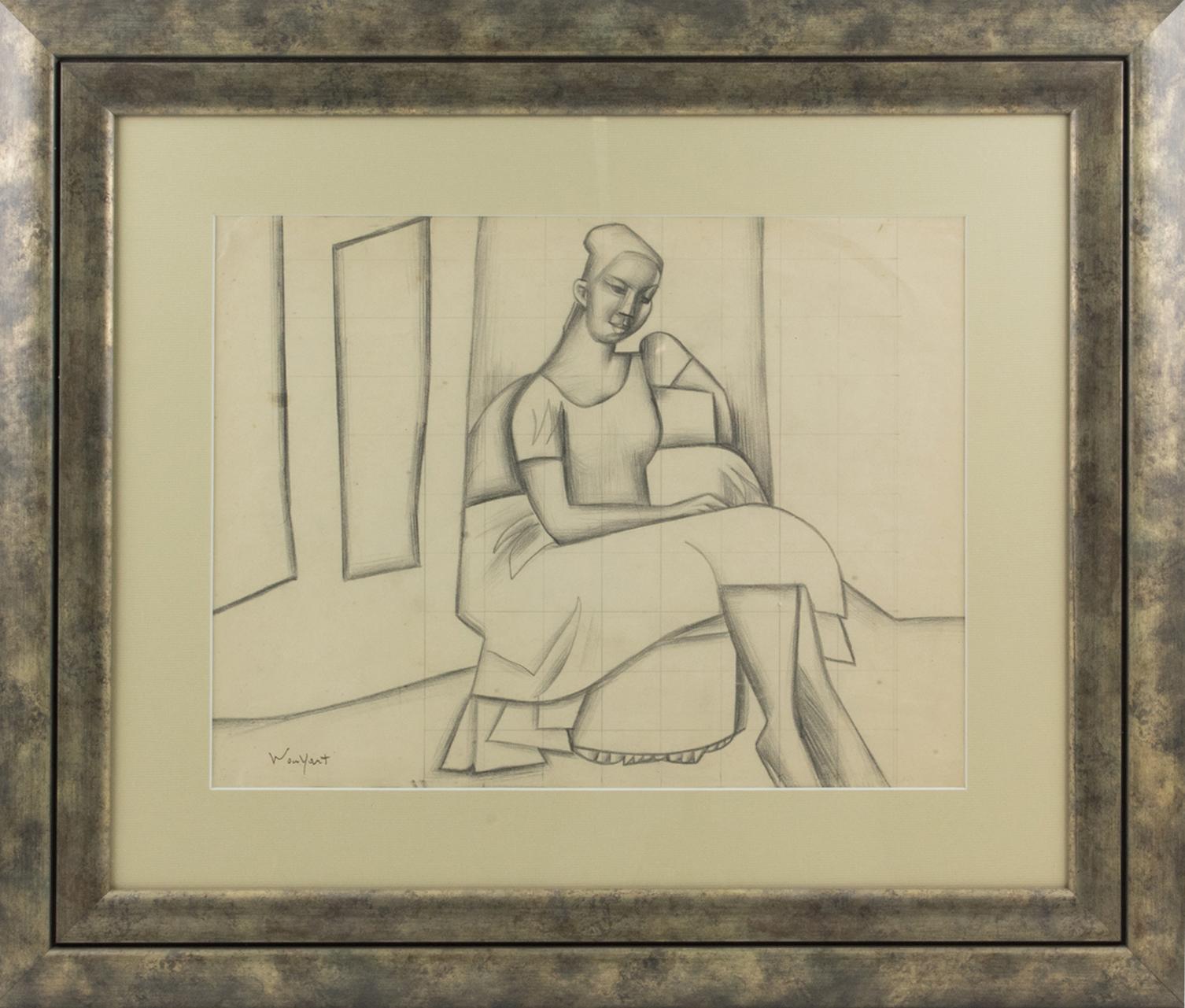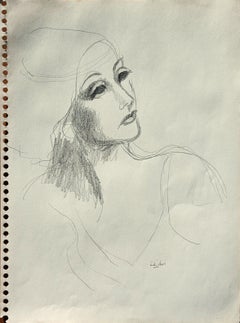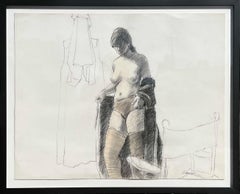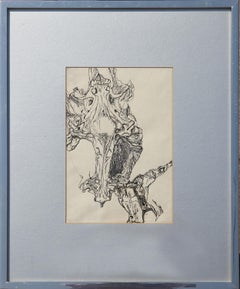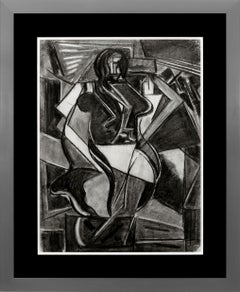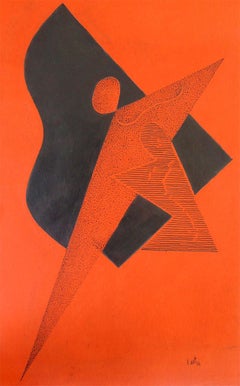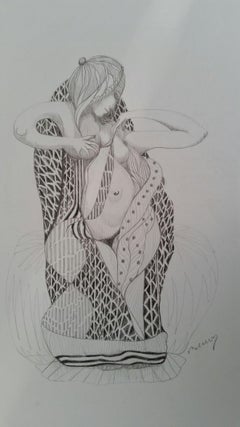Items Similar to Abstract Cubist Charcoal Drawing of a Standing Woman
Want more images or videos?
Request additional images or videos from the seller
1 of 8
Valery Kleveroy (Klever)Abstract Cubist Charcoal Drawing of a Standing Woman1988
1988
$1,500
£1,138.79
€1,305.02
CA$2,129.05
A$2,322.26
CHF 1,219.94
MX$28,094.55
NOK 15,261.86
SEK 14,410.23
DKK 9,741.10
About the Item
Black and white portrait of a woman done in a style that combines abstraction and cubism, much like the work of Fernand Leger. Signed and dated in lower left corner.
Artist Biography:
Valery Kleverov was born in Engels, Russian Federation, Soviet Union June 28, 1939 the son of a fighter test pilot in the Soviet Air Force. He exhibited an independent, rebellious, and highly artistic temperament from a young age. Conscription into the Red Army at the standard age of (18) was first and last straw in the young artist’s battle with the State, he lasted only a few months before making an unauthorized parachute jump over a forest to go permanently AWOL. After 3 weeks hiding in the woods, he eventually made his way to Leningrad, dropped his first name and the “ov” from the end of his name and began his life as the underground artist known as “KLEVER”. He fell in with a close-knit group of young anti-authoritarian rebels who eventually became known to the world as the “Non-Conformists”, a small gang of free thinkers mainly from Leningrad and Moscow who rebelled against State control of artistic expression and of free thought. In the Soviet Union, not only religion was outlawed - art, literature, music and dance were all subject to heavy censorship and state oversight. Among paintings historical, religious, abstract, anti-Soviet and erotic subjects were all against the law.
From 1966 to 1977 Klever made a reputation for himself as one of the non-conformists most overtly critical of the Soviet state. Many of his paintings from this period can be described as nothing less than heroic- they are truly remarkable visual essays on the evils of the national security/surveillance state, propaganda and manipulation of cultural symbols, suppression of artistic and religious freedom, revisionist history, and unfilled promises for the future. All of them were painted stored and exhibited not only at great risk to the artist and his associates, but also to anybody who sought to view them. In spite of the secrecy, the KGB discovered the existence of these pieces and began to follow Klever’s every move. There were surprise visits to his studio, harassment wherever he went, friends and family being questioned all a direct result of his determination to express himself artistically against Soviet control. From this time forward Klever had an exhibit which was open for viewing at all times inside the apartment of Bob Kashilohov as part of a network which paralleled the Samizdat network for sharing of forbidden literature.
Klever was arrested for his participation in the most important non- conformist exhibitions which took place during his time there. These were the Bulldozer Exhibition in Moscow, 1974, (so named because the KGB bulldozed the exhibition and destroyed much of the work) and the Nevski Dom exhibition in Leningrad, 1975. These exhibitions represented some of the early cracks in the foundations of the Soviet state’s control over the population’s basic aspirations for economic, personal and creative freedom that ended with collapse in 1991. Repercussions of the Bulldozer exhibition were that some of the painters were arrested or even killed. Approximately 70 artists were arrested, including Klever. Media outcry in the west allowed most of the artists to be released within a week. Two weeks later another exhibition was allowed to proceed and became known as “Half Day of Freedom” in the Soviet Union.
The Nevsky exhibition caused a huge sensation and was a watershed moment in the cultural history of the Soviet Union. People lined up for 30 blocks long over the course of the two week exhibition to see the forbidden works. Klever showed a large collection of explicit anti-Soviet paintings and was subsequently harassed and arrested again by the KGB. Klever was expelled from the Soviet Union with 62 other political “undesirables” in 1977. Artists and other dissidents with their immediate families were packed onto planes making stops in Paris, Vienna, and Jerusalem. Many of his associates chose Paris, Klever and his family disembarked in Vienna. Klever and his family eventually made their way to the United States, where they became citizens in 1982. While they made an attempt to return to the Soviet Union, after harassment from the KGB they returned to the United States permanently in May 1987.
He painted and drew a large number of nudes - bare female breasts with erect nipples are common motif, sometimes enmeshed with the political themes. Typical political imagery includes (spying) eyes, barbed wire, various restraints, crosses, and the hammer and sickle. Windows carry particular symbolic significance in Klever’s work as indicators both of what is (or was) and what should (or at least might) be. Klever worked in a wide range of styles in a remarkable career that spanned five decades. He painted impressionist landscapes to completely abstract mixed-media constructions and most everything in between, working in oil, watercolor, ink, charcoal, generally whatever was available to paint on or with. The most obvious modern influences are Chagall, Picasso, Leger, Malevich, and various Russian Futurists.
Klever passed away after a battle with cancer the day after his 74th birthday in 2013.
- Creator:Valery Kleveroy (Klever) (1938 - 2013, Russian)
- Creation Year:1988
- Dimensions:Height: 30 in (76.2 cm)Width: 22.5 in (57.15 cm)
- Medium:
- Movement & Style:
- Period:
- Condition:
- Gallery Location:Houston, TX
- Reference Number:Seller: AL0000.3641stDibs: LU55133517862

About the Seller
5.0
Gold Seller
Premium sellers maintaining a 4.3+ rating and 24-hour response times
Established in 1969
1stDibs seller since 2014
879 sales on 1stDibs
Typical response time: 12 hours
- ShippingRetrieving quote...Shipping from: Houston, TX
- Return Policy
Authenticity Guarantee
In the unlikely event there’s an issue with an item’s authenticity, contact us within 1 year for a full refund. DetailsMoney-Back Guarantee
If your item is not as described, is damaged in transit, or does not arrive, contact us within 7 days for a full refund. Details24-Hour Cancellation
You have a 24-hour grace period in which to reconsider your purchase, with no questions asked.Vetted Professional Sellers
Our world-class sellers must adhere to strict standards for service and quality, maintaining the integrity of our listings.Price-Match Guarantee
If you find that a seller listed the same item for a lower price elsewhere, we’ll match it.Trusted Global Delivery
Our best-in-class carrier network provides specialized shipping options worldwide, including custom delivery.More From This Seller
View AllEarly Modern Black & White Abstract Figurative Elegant Woman Drawing
Located in Houston, TX
Early modern black and white sketch by iconic Houston based artist David Adickes. Pulled from a collection of previously undiscovered sketchbooks, this work serves as a peak behind t...
Category
Mid-20th Century Modern Figurative Drawings and Watercolors
Materials
Paper, Pencil
Abstract Figurative Lithograph
By Rico Lebrun
Located in Houston, TX
Black and white figurative abstract lithograph of two naked, crouching figures by California artist "Rico Lebrun," titled "Crouching Figures" and dated 1961. Additional writing on th...
Category
1960s Abstract Abstract Prints
Materials
Lithograph
Black and White Abstract Figurative Mixed Media Drawing of a Female Nude
By William Anzalone
Located in Houston, TX
Black and white figurative drawing by Texas artist William Anzalone. The drawing depicts a nude woman in solitude taking off her ro...
Category
Late 20th Century Modern Figurative Drawings and Watercolors
Materials
Ink, Pen, Pencil
Black and White Fantastical Figure Abstract Drawing
Located in Houston, TX
Black and white pen and ink abstract figurative drawing depicting a fantasy animal skull-like shape. Framed and matted in a silver frame. Previously with DuBose Gallery, a leading na...
Category
20th Century Abstract Abstract Drawings and Watercolors
Materials
Paper, Ink, Pen
"Inconceivable Weaving" Black Abstract Print Embellished with Beads and Feathers
By Oksana Movchan
Located in Houston, TX
Black and grey toned abstract print on canvas embellished with beads and feathers. Signed, titled, and dated by artist in the lower right corner. Set in off-white frame.
Dimensions W...
Category
1990s Abstract Abstract Paintings
Materials
Canvas, Mixed Media, Black and White
Nude Woman Ink Wash on Paper
By Maurice Charles Louis Van Essche
Located in Houston, TX
Great example of Maurice Charles Louis Van Essehe's black and white ink drawing on paper of a reclining female nude.
Artist Biography:
Born in 1906, Maurice Van Essche's family mov...
Category
1960s Expressionist Nude Drawings and Watercolors
Materials
Ink, Paper
You May Also Like
"Modern Woman"
By Joseph Meierhans
Located in Lambertville, NJ
Jim’s of Lambertville is proud to offer this artwork by:
Joseph Meierhans (1890 - 1980)
Joseph Meierhans is one of the most important modernist painters associated with Bucks Count...
Category
20th Century Abstract Abstract Drawings and Watercolors
Materials
Paper, Charcoal
"Abstract Figure With Bird" original conte cubist drawing by Sylvia Spicuzza
By Sylvia Spicuzza
Located in Milwaukee, WI
The present work, drawn with black Conté crayon on a calendar sheet, Sylvia Spicuzza presents the viewer with a rhythmic vision. The scene is dominated by the figure of a woman in a ...
Category
1950s Modern Figurative Drawings and Watercolors
Materials
Conté
Abstract Figure - Czech Art
Located in London, GB
The work is hand signed in ink by the artist "b.ost" in the lower right corner, and hand dated "36" next to the signature.
The drawing was created in 1936.
Provenance: Collection So...
Category
1930s Modern Abstract Drawings and Watercolors
Materials
Paper, Ink
French Abstract Figure Mid 20th Century Signed Graphite and Watercolour
By Louis Bellon
Located in Cirencester, Gloucestershire
Abstract Nude Female Figure
by Louis Bellon (French 1908-1998)
Signed right left
Watercolour and graphite on paper, unframed
measurements: 11 x 7.5 inches (overall sheet measures 19...
Category
Mid-20th Century Abstract Nude Drawings and Watercolors
Materials
Watercolor, Graphite
Study of a Woman, Abstract Graphite on Paper by Remo Michael Farruggio
By Remo Michael Farruggio
Located in Long Island City, NY
Artist: Remo Farruggio, Italian/American (1904 - 1981)
Title: Study of a Woman
Year: 1955
Medium: Graphite on Paper, signed and dated
Size: 24 in. x 1...
Category
1950s American Modern Nude Drawings and Watercolors
Materials
Graphite
Cubist Woman Study Black Pencil Drawing by Wouyart
Located in Atlanta, GA
This interesting seated woman pencil study is by French artist Wouyart (20th Century). This unique representation captures the model's expression through trace lines and shadows that...
Category
1930s Cubist Portrait Drawings and Watercolors
Materials
Paper, Pencil, Carbon Pencil
More Ways To Browse
Black And White Line Drawing
Black And White Drawings Female Nudes
Black And White Two Nude Females
Cubist Woman
Parachute Vintage
Bare Breasts
Vintage Barbed Wire
Nude Breasts
Hammer And Sickle
Vintage Black Art
Original Art
Antique Artist
Used Magazine
Antique Prints Prints
One Of A Kind Art
Dior
Browning Oil Painting
Oil On Canvas Landscape Painting
